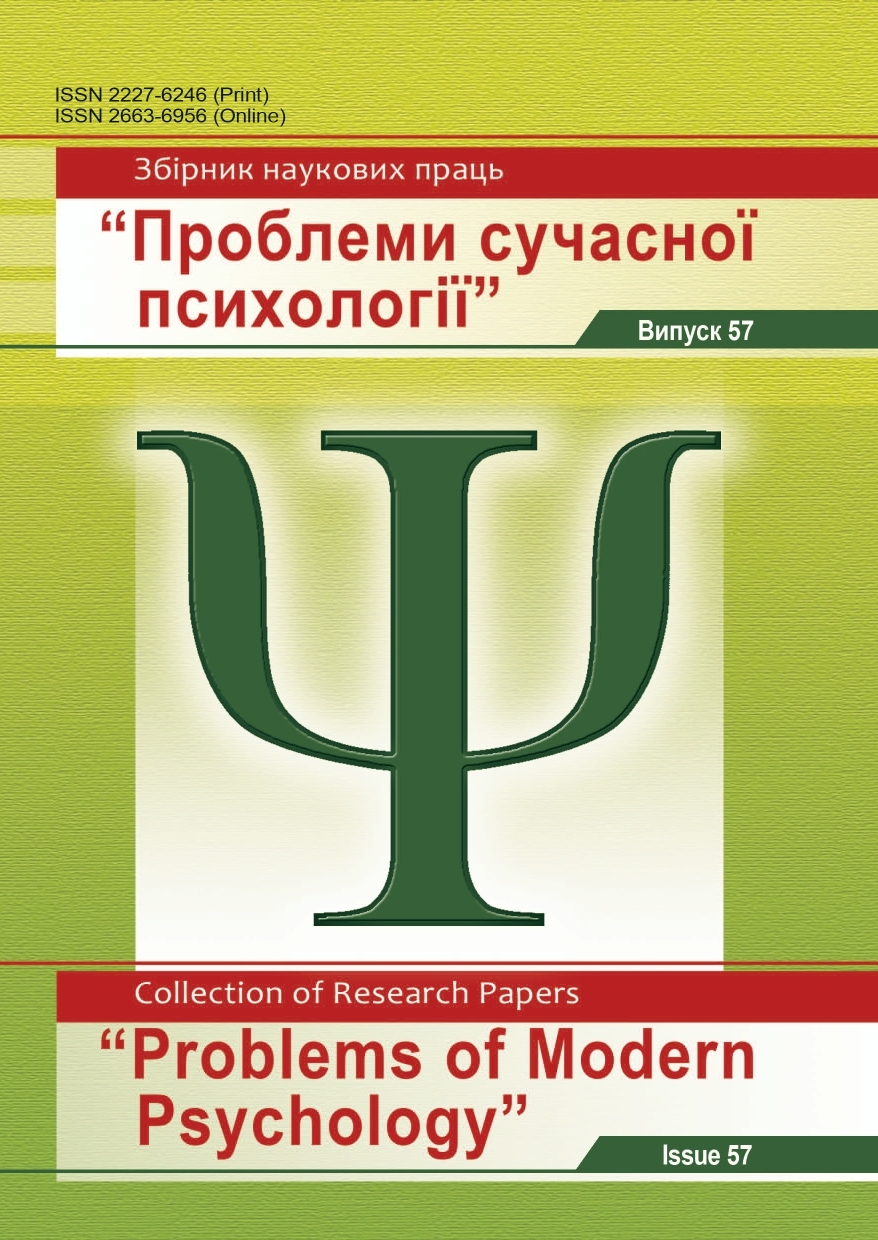Psychological Factors of Classroom Facilitative Management at Secondary School
DOI:
https://doi.org/10.32626/2227-6246.2022-57.128-146Keywords:
classroom facilitative management, facilitative interaction, teachers-facilitators, facilitate learning, mnemonic operations, the emotional moodAbstract
The purpose of our research is to propose psychological factors of classroom facilitative management at secondary schools.
Methods of the research. The following theoretical methods of the research were used to solve the tasks formulated in the article: the categorical method, structural and functional methods, the methods of the analysis, systematization, modeling, generalization. Also in our research the statement experiment was used as an empirical method.
The results of the research. We’ll identify the principles that should guide the teacher, who seeks to humanize interpersonal relationships with pupils: 1) from the very beginning and during the whole learning process the teacher needs to show the children his/her trust in them, in their personality; 2) pupils should be assisted in formulating and clarifying the goals and objectives that are formulated both for micro-groups and for each pupil individually; 3) we must always assume that pupils have an intrinsic motivation for the learning process; 4) the teacher should be a source of personal experience for pupils, which can always “be turned to” for the help of other people, be faced with difficulties in solving a problem; 5) it is important that this role is performed by the teacher in relations to each pupil; 6) the teacher should strive to develop the ability to feel the emotional mood of the micro-group and understand it; 7) we should strive to achieve empathic relationships that allow us to understand the feelings and the experiences of everyone; 8) the micro-group should actively demonstrate their feelings; 9) it is necessary to be an active participant in group facilitative interaction.
Conclusions. As a result of comparative studies, which in total surveyed 57 teachers and 92 pupils, we compared different performance indicators of teachers who had the ability to facilitate learning at different levels. The analysis of the behavior of pupils in the classes of teachers-facilitators showed that pupils were more proactive in the process of communication, they asked a lot of questions. Pupils spend more time solving learning tasks and problems, show higher levels of cognitive functioning. Pupils are also less likely to miss classes, demonstrate higher academic achievements in all disciplines, steadily increase their IQ and creativity throughout the school year.
References
Anderson, T., Liam, R., Garrison, D.R., & Archer, W. (2001). Assessing Teacher Presence in a Computer Conferencing Context. Retrieved from https://www.researchgate.net/publication/228749393_Assessing_Teaching_Presence_in_a_Computer_Conferencing_Context
Brophy, J. (2006). History of Research on Classroom Management. In C.M. Evertson & C.S. Weinstein (Eds.), Handbook of Classroom Management. Research, Practice, and Contemporary Issues, 17–43. Malwah, NJ: Lawrence Erlbaum Associates.
Cannon, R., & Newble, D. (2000). A Guide to Improving Teaching Methods. A Handbook for Teachers in University and Colleges. London: Kogan Page. 820 p.
Clifton, J. (2006). Facilitator talk. ELT journal, 60(2), 142–150.
Crosby, R.H.J. (2000). AMEE Guide No 20: The Good Teacher is more than a Lecturer-the Twelve Roles of the Teacher. Medical Teacher, 22(4), 334–347.
Donald, H., Chemelsky, B., & Palmer M. (1982). Nursery rhymes and prose passages: Preschooler’s liking and short-term retention of story events. Developmental Psychology, 18(1), 49–56.
Evertson, C.M., & Weinstein, C.S. (2006). Handbook of Classroom Management. Research, Practice, and Contemporary Issues. Mahwah, NJ: Larence Erlbaum Associates, Inc. 134 p.
Grasha, A.F. (1994). A Matter of Style: The teacher as Expert, Formal Authority, Personal Model, Facilitator, and Delegator. College Teaching, 42(4), 142–149.
Hmelo-Silver, C.E., & Barrows, H.S. (2006). Goals and Strategies of a Problem-Based Learning Facilitator. Interdisciplinary Journal of Problem-Based Learning, 1(1), 4.
Honcharuk, Nataliia, & Onufriieva, Liana (2018). Psykholohichnyi analiz rivniv pobudovy komunikatyvnykh dii [Psychological analysis of the levels of construction of communicative actions]. Psycholinguistics. Psykholinhvistyka. Psikholingvistika – Psycholinguistics. Psycholinguistics. Psycholinguistics, 24(1), 97–117. Retrieved from
https://doi.org/10.31470/2309-1797-2018-24-1-97-117 [in Ukrainian].
Ivashkevych, Er., & Komarnitska, L. (2020). Psychological aspects of comics as the paraliterary genres. Zbirnyk naukovykh prats «Problemy suchasnoi psykholohii» – Collection of research papers “Problems of modern Psychology”, 49, 106–130. Retrieved from https://doi.org/10.32626/2227-6246.2020-49.106-130.
Mykhalchuk, N., & Onufriieva, L. (2020). Psykholohichnyi analiz riznykh typiv dyskursu [Psychological Analysis of Different Types of Discourse]. Zbirnyk naukovykh prats «Problemy suchasnoi psykholohii» – Collection of scientific issues “Problems of modern psychology”, 50, 188–210. Retrieved from https://doi.org/10.32626/2227-6246.2020-50.188-210.
Downloads
Published
How to Cite
Issue
Section
License
Copyright (c) 2022 Khupavtseva Nataliia, Kurytsia Denys

This work is licensed under a Creative Commons Attribution-NonCommercial 4.0 International License.
Copyright
The Editorial Board has the full right to publish original scientific papers containing results of theoretical and experimental research works which are not currently subject to review for publication in other scientific editions. The Author shall transfer to the editorial board of the Collection the right to spread the electronic version of the paper, as well as the electronic version of the paper translated into English (for papers originally submitted in Ukrainian and Russian) by all kinds of electronic means (placement at the official website of the Collection, electronic databases, repositories etc).
The Author of an article reserves the right to use materials of the paper, without approval with the editorial board and the founders of this Collection: a) partially or fully, for educational purposes; b) for writing own dissertation papers; c) for preparation of abstracts, conference reports and presentations.
The Author of an article can place electronic copies of the paper (including the final electronic version downloaded from the official website of the Collection) at:
- personal web resources of all Authors (websites, webpages, blogs etc.);
- web resources of the institutions where the Authors are employed (including electronic institutional repositories);
- non-profit public access web resources (for example, arXiv.org).
But in all cases, it is obligatory to have a bibliographic reference to the paper, or a hyperlink to its electronic copy placed at the official website of this Collection.






